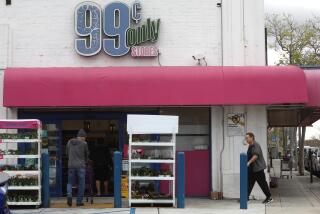When Major Retailer Calls It Quits, Town Opts to Open Shop
- Share via
ELY, Nev. — Brian Campbell picked through the underwear display while his wife, Kristina, unloaded an armful of clothes on the checkout counter. Over in the footwear department, fifth-graders Shawnee Day and Maria Dominguez were ogling the socks stitched with monkeys and puppies.
To the residents of Ely -- a two-stoplight mining town of about 4,000 in the mountains of eastern Nevada -- a trip to Garnet Mercantile is not as unremarkable as it sounds.
“I think it’s awesome,” Shellie Watts, a local power company finance assistant, said of the community-owned department store that opened this month. “Ely needs something like this. We’re desperate.”
When the town’s lone department store -- JCPenney -- announced last year that it was closing, Ely residents were faced with having to “drive 190 miles to Elko to buy a pair of socks,” said Dan Leoni, Garnet Mercantile’s general manager.
Appeals to Wal-Mart and other such retailers, which typically seek to locate in population centers of at least 50,000, were rebuffed.
So the town leaders formed their own corporation, Community Owned Mercantile Project Inc., and raised more than $400,000 by selling stock at $500 a share to investors from Ely and across Nevada.
Art Olson, owner of Steptoe Drug, one block south of Garnet Mercantile, bought six shares. “I figured it was an investment not only for the community, but for the downtown business area,” Olson said.
For guidance, Ely leaders looked to a successful community-owned store in Powell, Wyo., which was modeled after a similar one in Montana.
“Small towns are losing all their department stores,” said Mike Reile, buying consultant for Powell Mercantile, who also purchases the merchandise for Garnet Mercantile and another community store in Worland, Wyo. “In most cases, it leaves such a void in the community.”
“When [JCPenney] closed, the town was devastated,” said Melody Hawkins, a sales associate at Garnet Mercantile.
Stacy Mitchell, a senior researcher at the Institute for Local Self-Reliance -- a Minneapolis-based economic nonprofit group -- said that national high-volume retailers have driven many regional chains -- such as Ames in the Northeast -- out of business.
Major chains “are these huge companies, and there are very few of them,” Mitchell said. “There’s nothing in between anymore.... It’s conceivable that these local, community-owned stores could grow to fill that gap.”
Garnet Mercantile planners exceeded their $400,000 fundraising goal through a blitz of newspaper advertising, community meetings, word of mouth and calls across the state. Gov. Kenny Guinn even bought a couple of shares for White Pine High School’s student council.
Backers of the store contend the key to its success will be its ability to tailor inventory to the needs of the community, as opposed to the generic, centralized buying of a chain. Being run by Ely residents for Ely residents will help ensure that it serves their unique needs, they say.
“People are willing to stand up and take control of their own destinies, which is a good thing,” said William Robinson, an assistant professor of economics at the University of Nevada, Las Vegas. “All over rural Nevada, there’s issues just like that.... This is old-fashioned economics.”
Once they had the money, Ely residents called upon volunteers to make the 90-year-old JCPenney site new again. JCPenney, which stayed open nearly a year longer than planned, let the town keep about $50,000 worth of store fixtures when it closed in August.
Cheerleaders from White Pine High sorted and tagged the new merchandise after school; community members repainted the walls and ripped out the carpet and tile; a local artists’ group, for a cut-rate fee, painted the 1930s-style fashion mural that will hang on the store’s facade.
“It’s a can-do town,” Leoni said.
Although the manager and his eight part-time employees still are scrambling to get the 15,000-square-foot store ready for its official grand opening Dec. 4, most early shoppers seemed satisfied.
“It’s lovely,” said Barbara Forman, who owns Big 8 Full Service Tire Center with her husband, John. “I don’t think it’s been this clean in 30 years,” she said as burly, bearded men dug through the hunting shirts and young couples headed to the children’s section, toddlers in tow.
Some said they appreciated newly available name-brands -- including teen-friendly labels such as Lucky and Dickies.
A few customers complained of high prices. Forester Harry Rhea thought the $29.99 work shirts were a little “high-end” for his taste. But he agreed with the principle of the store: “If the community doesn’t get together and do it, it’s not going to happen.”
Early sales surpassed planners’ expectations: the store took in $20,000 its first week, and about $15,000 its second week, comparable to a normal sales period at the former JCPenney.
But Kurt Barnard, president of Barnard’s Retail Consulting Group in Nutley, N.J., warned that Ely’s initial enthusiasm about the store could wane. “A lack of understanding of what needs to be done ... a lack of management knowledge could catch up with them,” he said.
Leoni, the store manager, acknowledges the project’s risk, but his hopes remain high. “We want to serve the community, rather than make all the money we can and run.”
More to Read
Inside the business of entertainment
The Wide Shot brings you news, analysis and insights on everything from streaming wars to production — and what it all means for the future.
You may occasionally receive promotional content from the Los Angeles Times.










